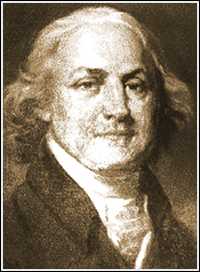FRtR > Biographies >
John Francis Mercer
A Biography of John Francis Mercer 1759-1821
*** Quote ***
 John Francis Mercer, born on May 17, 1759, was the fifth of nine children born to John and Ann
Mercer of Stafford County, VA. He attended the College of William and Mary, and in early 1776
he joined the 3d Virginia Regiment. Mercer became Gen. Charles Lee's aide-decamp in 1778, but
after General Lee's court-martial in October 1779, Mercer resigned his commission. He spent the
next year studying law at the College of William and Mary and then rejoined the army, where he
served briefly under Lafayette.
John Francis Mercer, born on May 17, 1759, was the fifth of nine children born to John and Ann
Mercer of Stafford County, VA. He attended the College of William and Mary, and in early 1776
he joined the 3d Virginia Regiment. Mercer became Gen. Charles Lee's aide-decamp in 1778, but
after General Lee's court-martial in October 1779, Mercer resigned his commission. He spent the
next year studying law at the College of William and Mary and then rejoined the army, where he
served briefly under Lafayette.
In 1782 Mercer was elected to the Virginia House of Delegates. That December he became one
of
Virginia's representatives to the Continental Congress. He later returned to the House of
Delegates in 1785 and 1786.
Mercer married Sophia Sprigg in 1785 and soon after moved to Anne Arundel County, MD. He
attended the Constitutional Convention as part of Maryland's delegation when he was only 28
years old, the second youngest delegate in Philadelphia. Mercer was strongly opposed to
centralization, and both spoke and voted against the Constitution. He and fellow Marylander
Luther Martin left the proceedings before they ended.
After the convention, Mercer continued in public service. He allied himself with the Republicans
and served in the Maryland House of Delegates in 1778-89, 1791-92, 1800-1801, and 1803-6.
Between 1791 and 1794 he also sat in the U.S. House of Representatives for Maryland and was
chosen governor of the state for two terms, 1801-3. During
Thomas Jefferson's term as President,
Mercer broke with the Republicans and joined the Federalist camp.
Illness plagued him during his last years. In 1821 Mercer traveled to Philadelphia to seek medical
attention, and he died there on August 30. His remains lay temporarily in a vault in St. Peter's
Church in Philadelphia and were reinterred on his estate, "Cedar Park" in Maryland.
 John Francis Mercer, born on May 17, 1759, was the fifth of nine children born to John and Ann
Mercer of Stafford County, VA. He attended the College of William and Mary, and in early 1776
he joined the 3d Virginia Regiment. Mercer became Gen. Charles Lee's aide-decamp in 1778, but
after General Lee's court-martial in October 1779, Mercer resigned his commission. He spent the
next year studying law at the College of William and Mary and then rejoined the army, where he
served briefly under Lafayette.
John Francis Mercer, born on May 17, 1759, was the fifth of nine children born to John and Ann
Mercer of Stafford County, VA. He attended the College of William and Mary, and in early 1776
he joined the 3d Virginia Regiment. Mercer became Gen. Charles Lee's aide-decamp in 1778, but
after General Lee's court-martial in October 1779, Mercer resigned his commission. He spent the
next year studying law at the College of William and Mary and then rejoined the army, where he
served briefly under Lafayette.